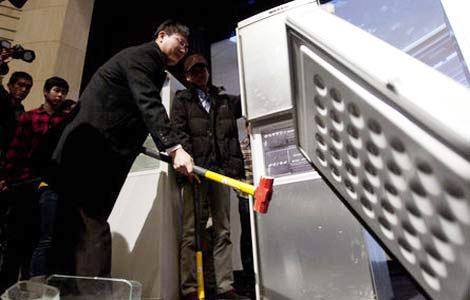US urged to correct wrong-doing on Chinese products
Updated: 2011-12-21 17:01
(Xinhua)
|
|||||||||||
BEIJING - China's Ministry of Commerce on Wednesday called on the U.S. to correct its wrong practice of slapping countervailing duties on Chinese imports when it does not give official recognition to the market economy status of China.
A statement on the ministry's website said the U.S. side has for many years kept launching countervailing probes against Chinese products, which violates WTO rules and lacks legal support of U.S. laws.
The statement came after the U.S. Court of Appeals for the Federal Circuit (CAFC) decided Monday that the U.S. CVD law should not apply to "non-market economy" (NME) countries.
The ministry said that the U.S. Department of Commerce had started anti-subsidy investigations against China since November 2006 even though current U.S. law states that government payments cannot be characterized as "subsidies" in an NME context, thus countervailing duty law does not apply to NME countries.
However, at the same time, the United States is one major developed nation that has loitered for years in officially recognizing the full market economy status of China, the world's second largest economy, the ministry said.
"The U.S. has more frequently resorted to AD and CVD duties against Chinese products, particularly after the global financial crisis broke out," the statement said, adding that the U.S. government's AD plus CVD probes against Chinese products totaled 30 during the past five years, without the authorization of U.S. laws.
The misuse of trade remedy measures is typical trade protectionism, the statement said.
"The U.S. Commerce Department is slapping anti-dumping duties on Chinese products through the method of seeking a surrogate nation, at the same time, it also wants a CVD, that's unfair treatment for Chinese companies and does harm to their interests," an unidentified official in charge of the Bureau of Fair Trade for Imports and Exports under the ministry was quoted as saying.
The official said the appellate body of the WTO also ruled in China's favor this March, declaring that the imposition of such a double penalty by the U.S. against Chinese products broke WTO trade rules.
A Chinese scholar of foreign trade said Wednesday that the ruling by the CAFC was an "epoch-making" victory for Chinese exporters who have long suffered unfair countervailing duties from the U.S. on top of anti-dumping duties.
"The ruling has provided clear judgment on the suitability for the U.S. to levy both anti-dumping and countervailing duties against a non-market economy," Tu Xinquan, associate director of China National Institute of WTO at the University of International Business and Economics, said in a comment reported by the Shanghai-based daily China Business News.
The CAFC decision came after Chinese tire maker Hebei Starbright Tire Co. Ltd. and its U.S.-based parent company GPX International Tire Corporation appealed to the U.S. Court of International Trade (CIT) ?following a decision by the U.S. Commerce Department to levy a 14-percent CVD on Hebei Starbright Tire in August 2008, the newspaper reported.
The CIT had ordered the U.S. Commerce Department not to impose CVD on goods from China because of the high likelihood of "double counting" when both CVD and AD were applied against goods from NME countries.
Sun Yong, an expert for legal matters with Double Coin Holdings Ltd. said this ruling showed that Chinese tire companies are seeking their rightful interests, and that the legal judgment of a "double slapping" of both CVD and AD by the U.S. Commerce Department is not sound.
However, Tu Xinquan warned that similar tricks from the U.S. government will not be stopped in future if its political motives for trade protection remain.
The MOC official said that as the world economy currently faces the severe risk of a downturn, it has become important that the two nations step up cooperation and reject trade protectionism.
Related Stories
Anti-dumping duties on US auto imports based on laws 2011-12-15 12:59
US auto imports face anti-dumping duties 2011-12-15 07:27
China to levy anti-dumping duty on US auto imports 2011-12-14 20:26
Hot Topics
HIV/AIDS, Egypt protest, Thanksgiving, climate change, global economic recovery, home prices, high-speed railways, school bus safety, Libya situation, Weekly photos
Editor's Picks

|

|

|

|

|

|






